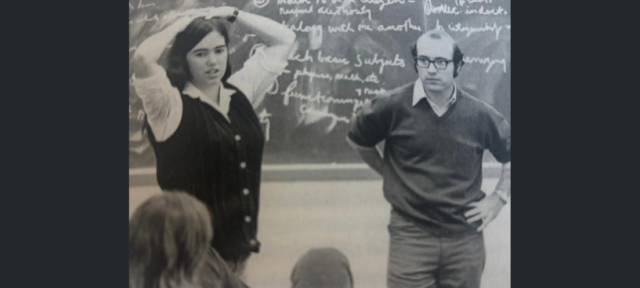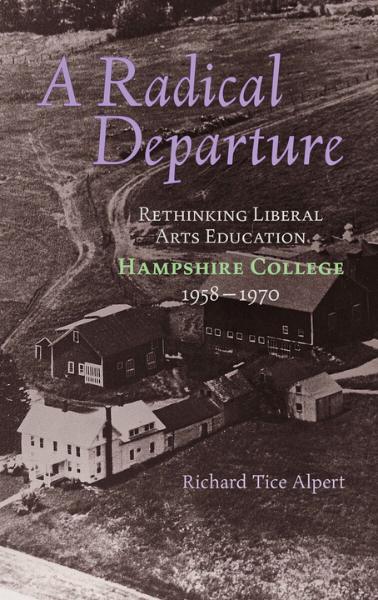Former Hampshire Dean Publishes Book on the College’s Earliest Years

Richard Tice Alpert discusses his exploration of Hampshire College’s very beginnings and how the school came to be in terms of ideas, planning, scholarship, and money.
Alpert arrived at Hampshire in September 1971 as its second school year kicked off. “I had been working at the Urban Institute, a think tank in Washington, D.C.,” he says. “A friend of my wife’s who was a graduate of Amherst College told me about Hampshire. I got in touch with Robert Birney, the founding dean of social science, and we had a number of interviews. I was excited at the prospect of doing something different and innovative in higher education. I had come from a very traditional academic background, and I was curious as to how such a departure would work.”
Alpert started as assistant professor of political science. He was eventually named assistant dean of the College, followed by associate dean of faculty and dean for strategic planning and institutional research, a position he held until he left Hampshire, in 1984. Just over 40 years later, he published his new book, A Radical Departure: Hampshire College 1958–1970 (2025, Levellers Press).
“I maintained connections at Hampshire and remained interested in how it came to be. In a more predictable and ordered world, that probably never should have happened,” he says. “I wanted to go back and examine how such a radical departure in higher education emerged from four traditional colleges and a university.”
When asked if he’d found anything surprising in the course of researching and writing the book, Alpert noted that he hadn’t realized the strong role the Ford Foundation played, thanks to its Fund for the Advancement of Higher Education. In 1957, it was headed by Amherst College graduate Philip Combs, who suggested to Amherst’s then-president Charles Cole that Amherst, Smith, Mount Holyoke, and UMass work together to establish a college to try out new educational and administrative ideas circulating in higher education. A $20,000 grant from the foundation enabled the formation of the committee of the four college presidents who wrote The New College Plan.
Alpert also expressed surprise regarding how Amherst alum Harold F. Johnson came to give an unrestricted gift of $6 million. Johnson had heard about the idea of starting a new college in the Pioneer Valley from the president of the Ford Foundation, Henry Heald. In 1964, Amherst President Calvin Plimpton made a routine fundraising call to Johnson, who responded with a question: “Would you be willing to start a new college? If you start it, I’ll give you six million dollars.” Plimpton agreed after, as he recalled in a 1986 interview, his “mind went over in a corner and vomited for a little while.”
Alpert said that although the concept of this new college was very removed from the ways in which colleges and universities had historically conceived of a liberal arts education, it was founded on traditionally conservative principles of individual choice, individual responsibility, and individual freedom. “The people and institutions that funded and founded Hampshire weren’t radical in their political or social beliefs,” he said. “I don’t think any of the people who wrote the founding plans for Hampshire wanted to disrupt the traditional social order.”
Indeed, Harold F. Johnson was against the College offering any financial aid, writing in 1975, “Adding the drain represented by financial aid makes the college even more financially weak...The commitment to financial aid implies deviation from the cult of excellence, which was the basic motive of the founders.” Nevertheless, the faculty and students who came to Hampshire in its early years tended to be interested in and ultimately committed to social justice, action, and equality, active inquiry, and sustainability, qualities that continue to drive Hampshire as an institution.
“I think it's very important for the College to endure, to be a model for a different way of approaching liberal arts education or higher education,” said Alpert, noting that the current political and social climate in the United States makes this particularly challenging. Of course, Hampshire has faced challenges from its beginnings; they’re part of its very DNA. The first student to be accepted, Lois Bailey, wrote in 1970 of the “‘revolutionary’ nature of Hampshire College . . . with the dream that education should and could be a joyful experience, a very condition of life, a never-ending series of exciting discoveries. . . . Hampshire asked us, the would-be students, faculty, and administration all together to help turn that philosophy into reality. It seemed to need us, and we couldn’t resist the challenge.”
Photo of an unidentified student and Richard Tice Alpert, September 1971, courtesy of the Hampshire College Archives.
A Radical Departure is available directly from Levellers Press and via Amazon.




